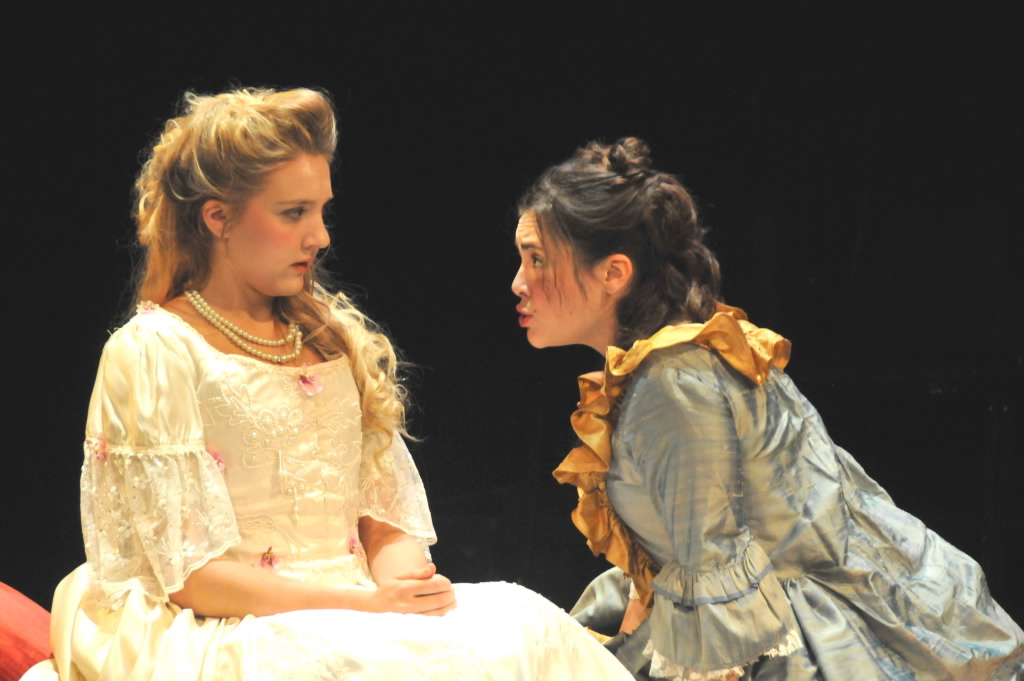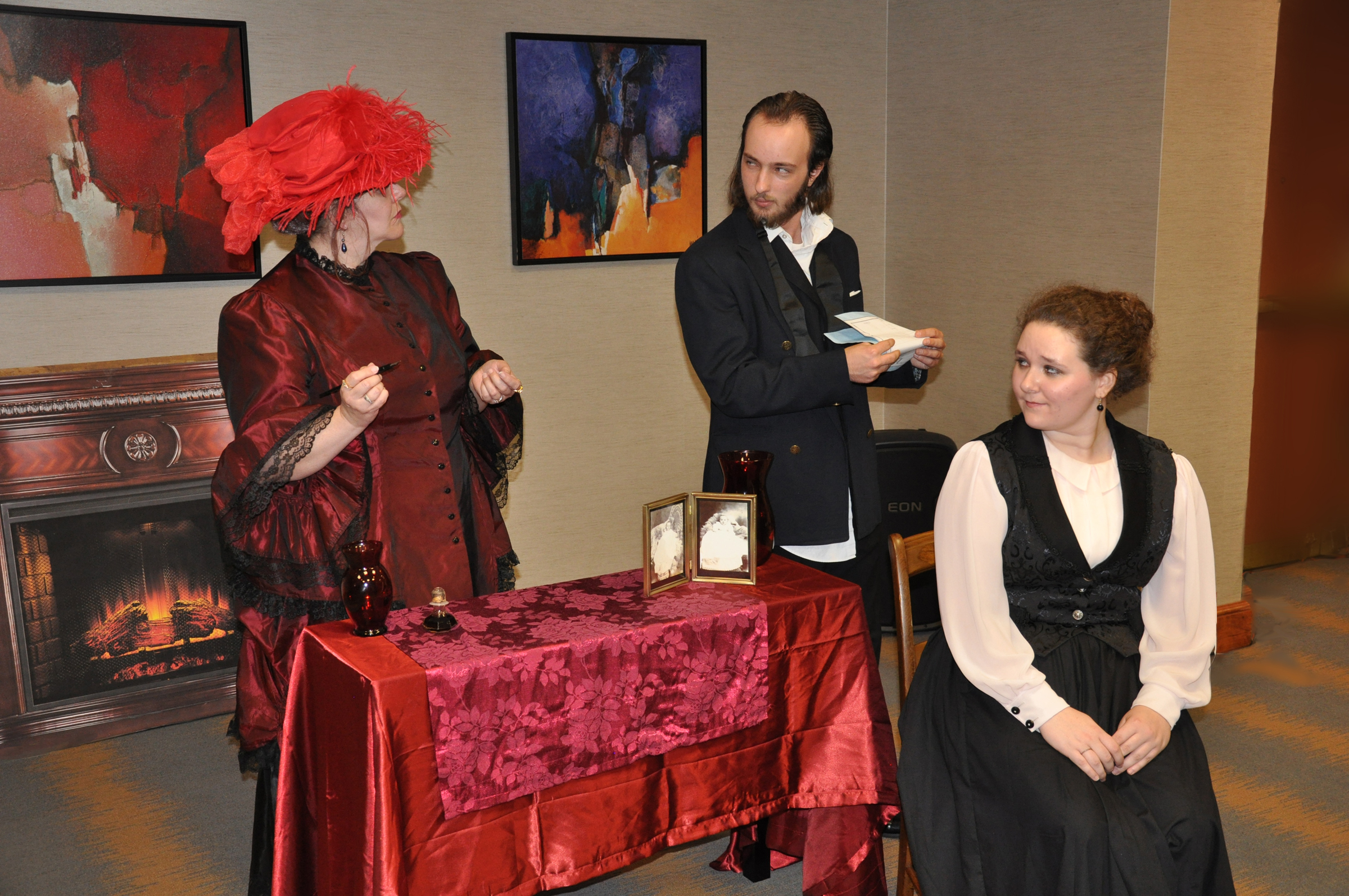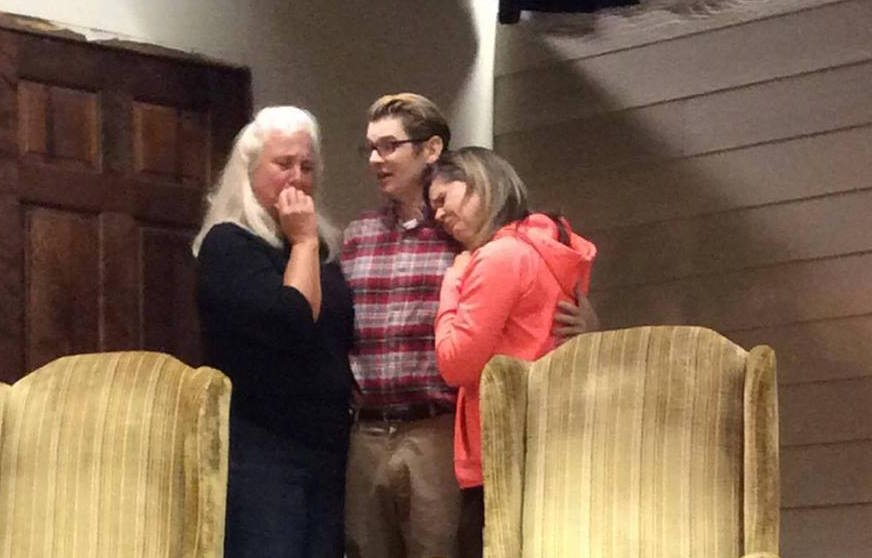Peyton Froula & Rebecca Willenbrink in The Beaux’Strategem.
Photo-Harlan Taylor
The Beaux’ Strategem
by George Farquhar, adapted by Thornton Wilder and Ken Ludwig
Directed by Hallie Dizdarevic
Review by Katherine Dalton
Entire contents copyright © 2015 by Katherine Dalton. All rights reserved.
This spring’s Young American Shakespeare Festival at Walden Theater /Blue Apple Players includes a classic comedy from the reign of Queen Anne instead of Queen Elizabeth. The Beaux’ Stratagem is the ill-fated Irish playwright George Farquhar’s final play, produced in 1707 just as he was dying. At Walden it is being done in an adapted version left incomplete by Thornton Wilder for a 1930’s Broadway production that never came to pass, and finished a decade ago by Lend Me a Tenor author Ken Ludwig.
Farquhar’s “beaux” are two young gentlemen who have all but run through their inheritances, and who have landed in Staffordshire with their last few hundred pounds, hoping that one of them will repair their mutual fortunes by wooing and winning an heiress. Aaron Roitman managed the necessary appeal of Jack Archer, an attractive if not always gentlemanly character, and Chase Bishop similarly pulled off the more ingenuous heartiness and basic decency of Tom Aimwell.
The play’s involved and antic plot includes–in addition to the young sweethearts necessary to any comedy–an unhappily married drunk, a preacher-cum-highwaymen, and the famous character Lady Bountiful. In these roles Parker Henderson used his strong voice to barrel his way through his character as the sottish, miserable Sullen, while Travis Ryan made a glib and unflappable Gloss. As rewritten by Wilder and Ludwig, Lady Bountiful’s harmless and well intentioned medical advice in Farquhar’s original has become bizarrely macabre “cures” that general involve a saw. She is now not a gently absurd character, but an absurdist one. Ruthie Dworkin played her with cheerful senselessness.
Restoration comedy is half dance. Look at the Lely portrait of Queen Anne’s uncle King Charles II, from a few decades before this play was written—even seated Charles has his feet arranged in what in ballet is called fourth position. The gestures, the lace handkerchiefs, the heavy wigs, and the high boots—it was an era of elaborate dress, formal manners, refined carriage and straight backs. Playing a Restoration comedy is an opportunity for a young actor to put on not just the silks or pumps of the period, but all that attitude.
I missed that aspect in this more slouching production, with a few exceptions. One was Emma Payne as Cherry, the innkeeper’s daughter. She not only moved well (her background in ballet shows) and spoke well, but also played her part with an appropriate piquancy, strength and depth.
Peyton Froula was indeed lovely as the lovely Dorinda. Rebecca Willenbrink took on the difficult role of Kate Sullen, and was able to remain charming while mocking her drunk of a husband and her ghoul of a mother-in-law, and while pining for a man she is not married to and hardly knows. (This play is full of appealing compromised characters.) Ruairidh Kerr as Lady Bountiful’s servant Scrub also deserves a mention, as he was funny and always worth watching, even when he had few lines. He also had a terrific pratfall in the second half of the play—and good physical comedy should never be underrated.
Usually American productions of British plays use American accents, but director Hallie Dizdarevic asked her actors to speak in British accents for this one. As a teaching tool this was a good challenge for the actors, but it had mixed results for the audience, as there was a character or two whose accent was hard to understand. Best success in this was had by Helen Lister, in a small role as a countrywoman, and Hermione Bean-Mills as Foignard, whose good timing in delivering her lines made her enjoyably absurd French accent all the funnier.
On opening night the play really hit its stride after the intermission. The scene in which the plot to rob Lady Bountiful’s house is foiled was paced well, and along the way several characters delivered good monologues. The earnest argument on the merits of divorce with which the plays ends—Farquhar was unhappily married, and very modern in his views on the subject—was also handled with good energy and pacing. It was a pleasure to see these young actors get the structure and timing right in a scene full of emotion and reversals.
All is all it was a fun evening, and I felt grateful once again to Walden for producing a classic play that is seldom performed in this country—but so interesting to act and to watch.
The Beaux’ Strategem
Part of the 2015 Young American Shakespeare Festival
May 7, 9, 11, 14, 16 @ 7:30pm
Walden Theatre / Blue Apple Players
The Nancy Niles Sexton Theatre
1123 Payne Street
Louisville, Kentucky 40204
502-589-0084
waldentheatre.org
[box_light] Katherine Dalton began working in journalism at The Yale Literary Magazine, during its brief period as a national magazine based at Yale. She has also worked at Harper’s Magazine and Chronicles, where she remains a contributing editor. She has written for publications ranging from the Wall Street Journal and the Baltimore Sun to the University Bookman and Harper’s Bazaar. Ms. Dalton is a contributor to Wendell Berry: Life and Work (edited by Jason Peters), Morris Grubb’s volume Conservations with Wendell Berry, and is currently at work on a book about farming. She lives in Kentucky.[/box_light]
Katherine Dalton began working in journalism at The Yale Literary Magazine, during its brief period as a national magazine based at Yale. She has also worked at Harper’s Magazine and Chronicles, where she remains a contributing editor. She has written for publications ranging from the Wall Street Journal and the Baltimore Sun to the University Bookman and Harper’s Bazaar. Ms. Dalton is a contributor to Wendell Berry: Life and Work (edited by Jason Peters), Morris Grubb’s volume Conservations with Wendell Berry, and is currently at work on a book about farming. She lives in Kentucky.[/box_light]





